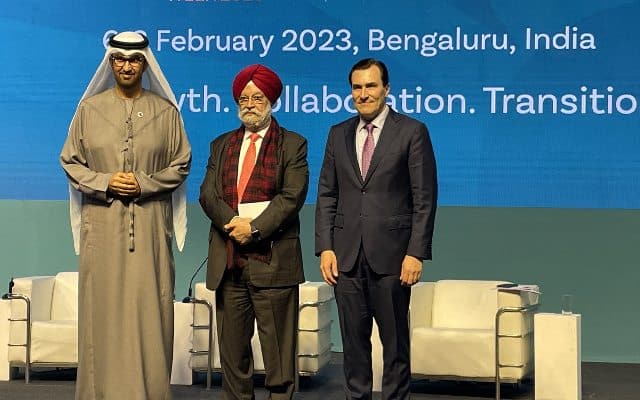Bengaluru: President-designate for COP28 UAE Sultan Al Jaber on Tuesday February 7 made the case for a pro-growth, pro-climate agenda to support an inclusive energy transition that leaves no one behind.
Speaking at the India Energy Week in Bengaluru at the Asian Ministerial Energy Roundtable, Jaber noted that the world’s fastest growing major economy was dealing with the central question of how to embed sustainable, environment-friendly growth into its development model.
“As India’s economy surges, it is dealing with the fundamental question that the whole world faces. How to adopt policies that are pro-growth and pro- climate at the same time. How to provide for a world that will consume 30 per cent more energy by 2050, while protecting our planet. In short, how to hold back emissions, not progress,” Jabar, who is the CEO of Abu Dhabi National Oil Company, noted.
The president-designate noted the significant rise in investment in renewable energy in recent years and India’s drive to add 500 GW of clean energy by 2030, adding that the UAE was keen to partner with India and the world on advancing clean energies.
“Last year, despite an ongoing war, fears of recession and a world still recovering from Covid, annual global investment in clean energy exceeded $1 trillion for the first time. And the trajectory is only going up. Most of this new growth will be driven by the dynamic economies of Asia. Here in India, you are aiming for 500 GW of clean energy by 2030. This is very ambitious, but also very achievable. And the UAE is ready, willing and able to partner with you. We have spent the last two decades diversifying our energy portfolio. We’ve invested in nuclear, we are investing hydrogen and we are expanding our global renewable energy footprint to at least 100 GW by 2030. And we need everyone on this journey with us, so that together we can triple global renewable energy capacity over the next seven years.”
Jaber reiterated that policies should take into account the fact that too many people, particularly across the global south still have no or very limited access to energy.
“Their needs must be met as we transition to a new energy system and accelerate progress on all aspects of the climate agenda,” he noted.
Earlier, while delivering the inaugural address at the roundtable, petroleum minister Hardeep Puri said that Asian economy has grown at the average rate of 5.5 per cent over the preceding two decades and registered growth of 6.5 per cent posted in 2021, while it is expected to moderate to 4 per cent in 2022 amid an uncertain global environment and rise to 4.3 per cent in 2023.
“On one hand, advanced economies committed over 500 billion in funds to support and shield consumers and secure alternative fuel supplies by temporarily reverting to nuclear and higher carbon intensity (coal, oil) to fill the energy supply gap, some economies have continued to exacerbate fuel poverty and food insecurity,” the minister said.
“Going forward as the challenges are likely to only become more acute, the value of preparedness against such potential shock is going to start an era of building resilience,” he added.
Referring to India’s transitional journey, Puri said, “E20 was rolled out by the prime minister yesterday, much earlier than the initial target date of April 1, 2023. Fifteen cities will be covered under the first phase. We are targeting a phased rollout of E20 in the entire country between now and April 2025. We are also targeting the setup production capacity of 15 MMT of CBG from 5,000 plants by 2023 with an investment of $20 billion.”
India is setting up 2G refineries utilising agricultural waste and bamboo to make ethanol, using indigenous technology. This contributes to achieving rural prosperity and also goes a long way in reducing pollution along with achieving energy security goals, the minister said.




